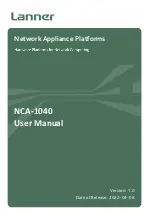
ADSL2+ Combo Modem Router
75
FTP
File Transfer Protocol. The Internet protocol (and program) used to transfer files between hosts.
IPoA (RFC 1577)
Classical IP and ARP over ATM. Considers ATM configured as a Logic IP Sub-network(LIS) to
replace Ethernet local LAN segments.
ISP
Internet service provider. A company that allows home and corporate users to connect to the
Internet.
LAN
Local area network. A limited distance (typically under a few kilometers or a couple of miles)
high-speed network (typically 4 to 100 Mbps) that supports many computers.
MAC
Media Access Control Layer. A sub-layer of the Data Link Layer (Layer 2) of the ISO OSI Model
responsible for media control.
MTU
Maximum Transmission Unit
NAT
Network Address Translator as defined by RFC 1631. Enables a LAN to use one set of IP address
for internal traffic. A NAT box located where the LAN meets the Internet provides the necessary IP
address translation. This helps provide a sort of firewall and allow for a wider address range to be
used internally without danger of conflict.
PPP
Point-to-Point-Protocol. The successor to SLIP, PPP provides router-to-router and host-to-network
connections over both synchronous and asynchronous circuits.
PPPoA (RFC 2364)
The Point-to-Point Protocol(PPP) provides a standard method for transporting multi-protocol
datagrams over point-to-point links. This document describes the use of ATM Adaptation Layer 5
(AAL5) for framing PPP encapsulated packets.
PPPoE (RFC 2516)
This document describes how to build PPP sessions and encapsulate PPP packets over Ethernet.
PPP over Ethernet (PPPoE) provides the ability to connect a network of hosts over a simple
bridging access device to a remote Access Concentrator.
PVC
Permanent Virtual Circuit. Connection-oriented permanent leased line circuit between end-stations
on a network over a separate ATM circuit.
RFC
Request for Comments. The document series, begun in 1969, which describes the Internet suite of
protocols and related experiments. Not all RFCs describe Internet standards, but all Internet standards
are written up as RFCs
















































